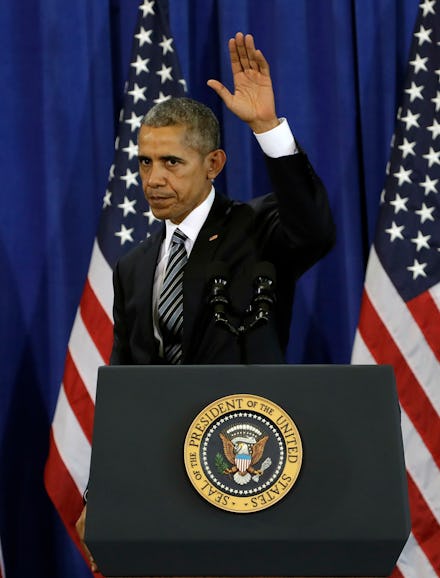5 presidential quotes from prior presidents' farewell addresses

On Jan. 10, President Barack Obama traveled to Chicago to deliver his farewell address, and he already gave us a sneak preview of what his speech may be like. Through his Facebook page, President Barack Obama said that "Chicago is all where it started, it's the city that showed us the power and fundamental goodness of the American people." He added that "We've made America a better, stronger place for the generations that will follow."
The White House's official Twitter account is preparing ahead of Obama's speech.
The farewell address is a tradition which began with George Washington, in an attempt to reflect on the successes and failures of the outgoing administration while sharing their visions for the future. As we are expecting to hear from President Barack Obama tonight, here's a look back at some of the most memorable quotes.
1. George Washington on the perils of partisanship
It's been nearly 221 years since George Washington delivered the first farewell address. Unbeknownst to him, this is what the state of politics became today:
"I have already intimated to you the danger of parties in the State, with particular reference to the founding of them on geographical discriminations. Let me now take a comprehensive view, and warn you in the most solemn manner against the baneful effects of the spirit of party generally."
2. Harry Truman on his role as president
According to Time, President Harry Truman revived the tradition of the farewell address. In it, he acknowledged his decisions were not always popular, yet he asked Americans to be in his position.
"I want all of you to realize how big a job, how hard a job, it is — not for my sake, because I am stepping out of it — but for the sake of my successor. He needs the understanding and the help of every citizen. It is not enough for you to come out once every four years and vote for a candidate, and then go back home and say, 'Well, I've done my part, now let the new president do the worrying.' He can't do the job alone."
3. Jimmy Carter on environmental matters
In his final speech, President Jimmy Carter pointed out several environmental challenges but offered a glimmer of hope.
"There are real and growing dangers to our simple and most precious possessions: the air we breathe; the water we drink; and the land which sustains us. The rapid depletion of irreplaceable minerals, the erosion of topsoil, the destruction of beauty, the blight of pollution, the demands of increasing billions of people, all combine to create problems which are easy to observe and predict but difficult to resolve. If we do not act, the world of the year 2000 will be much less able to sustain life than it is now. But there is no reason for despair. Acknowledging the physical realities of our planet does not mean a dismal future of endless sacrifice. In fact, acknowledging these realities is the first step in dealing with them. We can meet the resource problems of the world — water, food, minerals, farmlands, forests, overpopulation, pollution — if we tackle them with courage and foresight."
4. Ronald Reagan on openness
President Ronald Reagan discussed the importance of city walls having doors to welcome everybody — a message President-elect Donald Trump should heed.
"I've spoken of the shining city all my political life, but I don't know if I ever quite communicated what I saw when I said it. But in my mind it was a tall, proud city built on rocks stronger than oceans, windswept, God-blessed, and teeming with people of all kinds living in harmony and peace; a city with free ports that hummed with commerce and creativity. And if there had to be city walls, the walls had doors and the doors were open to anyone with the will and the heart to get here. That's how I saw it, and see it still."
5. Bill Clinton on equality
During his farewell address, President Bill Clinton celebrated the diversity of our country:
"We must remember that America cannot lead in the world unless here at home we weave the threads of our coat of many colors into the fabric of one America. As we become ever more diverse, we must work harder to unite around our common values and our common humanity. We must work harder to overcome our differences, in our hearts and in our laws. We must treat all our people with fairness and dignity, regardless of their race, religion, gender, or sexual orientation and regardless of when they arrived in our country — always moving toward the more perfect Union of our Founders' dreams."